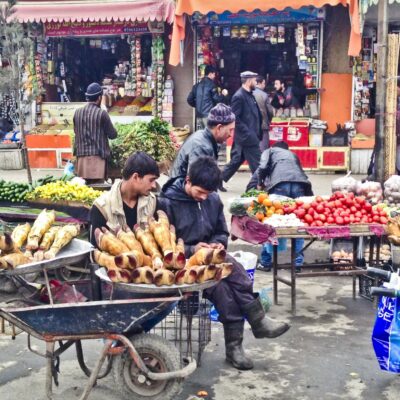“We just want to elect our government in Hong Kong. Just like how people in previous days fought for democracy around the world I think we will continue until the day we achieve it.”
Joshua Wong, Hong Kong pro-democracy activist in interview with the author, February 12, 2020.
The question of what Hong Kong will look like under Chinese rule into the future has been brought into sharp focus over the past eight months and continues to unfold in 2020, even as the coronavirus (COVID-19) outbreak partly deters large public demonstrations.
The second half of last year saw the biggest protests ever in the history of the Chinese-controlled territory of Hong Kong.
The protest movement grew from peaceful opposition in early 2019 to a government plan to amend extradition laws, to protracted violent clashes between police and protestors calling for universal suffrage in elections for the Legislative Council (the body which makes the City’s laws) and the Chief Executive – the Hong Kong’s most senior leader.
The main question as protests escalated, at least at first, was whether Beijing would intervene militarily, especially after a suspected build-up of Chinese military within Hong Kong beginning in August last year.
Pro-democracy activist Joshua Wong, who is probably the most internationally reorganizable face of the movement, says a political crisis can only be solved by a political solution. He’s focused on Legislative Council elections in September this year (the exact date is yet to be set). “We take the majority to show that the Legislative Council should be the place that represents the voice of people [..] that is one of our goals”, he said.
The 23-year-old was nominated for the Nobel Peace Prize in 2017 for his central role in the so-called Umbrella Movement, which saw demonstrators bring Hong Kong to a standstill in 2014 calling for the right for the City to choose its own leaders.
Wong is now one of the leaders of pro-democracy party Demosistō and actively promotes the pro-democracy issues internationally. He testified in the US Congress late last year as US lawmakers prepared to vote on the Hong Kong Human Rights and Democracy Act, which could pave the way for diplomatic and economic sanctions. US President Donald Trump signed the bill on 27 November 2019, saying he did so out of “out of respect for President Xi [Jinping], China, and the people of Hong Kong”.
On July 1 1997, President Xi stated in a speech to mark the official handover of Hong Kong from Britain to China that:
“History will remember Mr. Deng Xiaoping for his creative concept of “one country, two systems.” It is precisely along the course envisaged by this great concept that we have successfully resolved the Hong Kong question.”
But for Wong, who was born less than a year before the handover, “the Hong Kong question” remains very much unanswered as many of his generation witness what they regard as Beijing’s slowly tightening grip on Hong Kong. “Beijing promised to guarantee “one country, two systems’ in Hong Kong, but after the ‘Umbrella Movement’ they have tried to build ‘one country, one-and-a-half systems’”, he said.
Wong and other young activists have shown themselves to be committed to achieving their goals. He was arrested by Hong Kong police and charged in August last year with offences including taking part in unlawful assembly. He has previously been jailed three times for pro-democracy related activity.
He’s one of more than 7,000 protestors who have been arrested since last June and Hong Kong police say more than 1,000 have been charged. The Police Force’s Budget has recently been boosted by 25%. Amnesty International and others have expressed concern about arbitrary arrest and police brutality.
The protest movement has been somewhat subdued since the beginning of 2020 by the outbreak of COVID-19 in China and elsewhere, with protestors deterred by the risk of infection.
However, Wong says he is unfazed. “It might reduce the number of protests in the short-run. But it will strongly, rapidly increase people’s dissatisfaction with the government, especially how the government refused to shut down and close the border and allowed mainland Chinese visitors to still travel to Hong Kong. It has just put people at risk […]. Even lots of pro-Beijing supporters criticised the way the Hong Kong Government is handling the crisis”, he said.
Protestors seem to have widespread support among the public. In district council elections in November 2019, pro-democracy candidates won 385 out of 452 seats, leaving only 59 seats held by pro-Beijing candidates (although the exact numbers depend how individual candidates are classified). Voter turnout was high: more than 71%, compared with 47% at the previous district council elections in 2015 [add hyperlink to MAR Edition 1 Victor Yim].
One of the most significant outcomes of last year’s district elections – which involve bodies that mainly deliver public facilities and services rather make policy– is that pro-democracy district councillors may gain six seats on Hong Kong’s semi-representative Legislative Council.
The Council has 70 members who collectively have the power to make and repeal laws and approve budgets. A small group of its members are elected from candidates nominated by district councillors.
Wong is focused on Legislative Council elections in September, (on a date yet to be set) which he sees as building on last year’s district council results.
“The short-term goal was to withdraw the extradition bill, and that’s the goal we achieved last September. The midterm goal is to stop the police brutality by calling for investigations by independent inquiry committee led by a retired judge […] And the long-term goal is to have free elections”, said Wong.
Wong says he’s not optimistic about the Chinese regime, but he is optimistic about the actions of the Hong Kong people.
Image: Joshua Wong. Studio Incendo/Flickr




